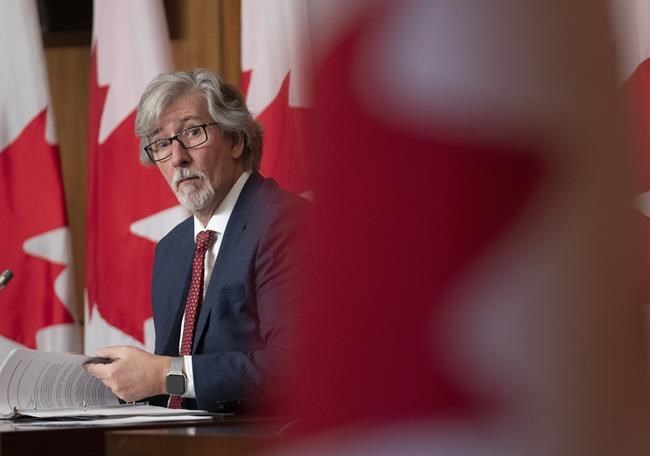OTTAWA ÔÇö The federal privacy commissioner says his offer to advise the government on the implications of collecting data from millions of mobile phones during the COVID-19 pandemic was rebuffed.
Daniel Therrien told a House of Commons committee this week that he offered to review how the data was being anonymized, but the government consulted its own privacy advisers instead.
Members of Parliament passed a motion on Tuesday that called on the government to suspend a plan to extend the collection of mobile-phone location data. The MPs wanted privacy concerns to be looked into first.  
NDP MP Matthew Green said there were "serious concerns" that the government has so far refused requests to pause the second phase of mobile data collection.
"Canadians all expect a certain level of privacy, especially when it comes to their cellphones, and we need to take a closer look to see if our current laws and regulations are sufficient in our current age of big data," Green said. 
The Public Health Agency of sa╣·╝╩┤½├¢ has said the data would be used to help the government understand travel patterns during the COVID-19 pandemic.
The office of Health Minister Jean-Yves Duclos said the data does not contain personal information that would identify anyone and it is committed to safeguarding privacy.  
A statement from the minister's office said its priority was keeping Canadians healthy and safe while upholding privacy standards.
"Over the course of the pandemic, PHAC has used de-identified and aggregated data to inform our governmentÔÇÖs response to COVID-19 and to transparently provide Canadians with information on the pandemic," it said.┬á
"While the mobility data being used by PHAC does not contain personal information, we will continue collaborating with the ethics commissioner and remain committed to safeguarding the privacy of Canadians.ÔÇØ
The privacy commissioner said he is currently investigating complaints about the collection of mobile-phone data. He told the ethics committee that he plans to look at whether people could be identified from the anonymized mobile phone data.
"Now that we have received complaints alleging violations of privacy, we will turn our attention to the means chosen for de-identification and whether they were appropriate to safeguard against re-identification," he said. 
"We offered to review the technical means used to de-identify data and to provide advice, which was declined. The government relied on other experts to that end, which is its prerogative."
In December, the public health agency issued a new request for proposals to track countrywide cell tower-based location data between Jan. 1, 2019, and May 31, 2023.
The notice said the data must be accurate, accessible and timely, as well as ensuring privacy and transparency. It must also be stripped of all identifying information.
MPs on the Commons ethics committee, including Liberal MPs, voted after Parliament returned from its winter break to halt the new tender until it could explore the privacy implications of the plan. 
On Tuesday, Bloc Qu├®b├®cois, Conservative and NDP MPs voted in the House to suspend the tender until the Commons ethics committee could report that the privacy of Canadians will not be affected by the mobile-phone data plans.┬á
Liberal MPs voted against the motion. The government can choose to ignore it, allowing the public health agency to push ahead.
Opposition MPs, including Tory House Leader John Brassard, urged the government to halt the plans until MPs are satisfied personal privacy is being protected. 
Brassard said the privacy commissioner would have been the right person to have examined the issue.
"The privacy commissioner is charged with ensuring privacy legislation is followed and the privacy rights of Canadians are protected," he said. 
"When he offers to provide advice, in almost all cases the government takes him up on his offer, but this time they said 'that's OK.' The whole situation, to me, is questionable." 
This report by The Canadian Press was first published Feb. 9, 2022. 
Marie Woolf, The Canadian Press



